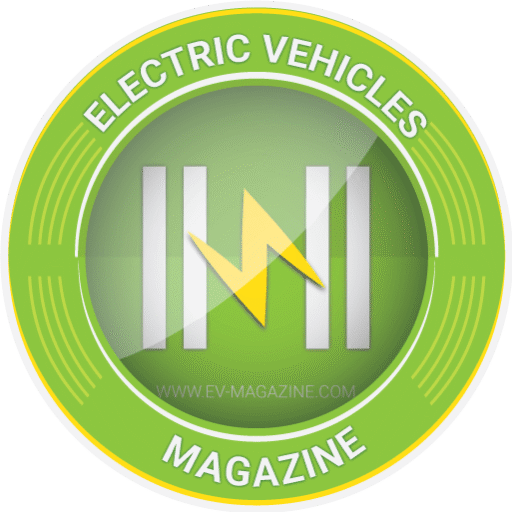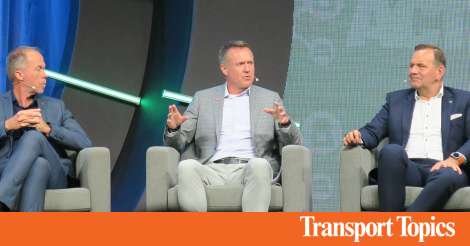Navistar CEO Mathias Carlbaum (left) and VTNA President Peter Voorhoeve (right) listen as Peterbilt General Manager Jason Skoog speaks during a panel session at ACT Expo 2024 in Las Vegas. (Seth Clevenger/Transport Topics)
[Stay on top of transportation news: Get TTNews in your inbox.]
LAS VEGAS — Battery-electric truck adoption rates surprised to the downside over the past five years, a panel of the most powerful executives at America’s truck manufacturers told ACT Expo 2024 attendees, but they say there is no going back.
“We thought if we built it, they would come, and we were wrong,” Daimler Truck North America CEO John O’Leary told attendees.
“We are all impatient people, so it could have gone faster,” Volvo Trucks North America President Peter Voorhoeve said.
Voorhoeve’s counterpart at Volvo Group sister company Mack Trucks, Jonathan Randall, concurred, noting: “Our optimism and exuberance about our first battery-electric truck were not matched by customers’ response.”
Daimler Truck North America CEO John O’Leary says OEMs overestimated fleets’ eagerness to purchase battery-electric trucks. (Keiron Greenhalgh/Transport Topics)
Peterbilt General Manager Jason Skoog said, “I think we all want more, but we can be very happy with the progress.”
Positive surprises in the past five years came in the form of joint ventures and products that are more advanced than expected, said O’Leary, but on the downside, the ramp-up curve has flattened.
“Our optimism and exuberance … were not matched by customers’ response.” Mack Trucks President Jonathan Randall says. (Keiron Greenhalgh/Transport Topics)
Navistar CEO Mathias Carlbaum is optimistic the tide is turning, however, arguing adoption rates in the next five years are going to be exponentially faster than over the past five years.
More than one panel member urged audience members from fleets and carriers to not get left behind.
“You can’t wait. Whether it is a battery-electric vehicle, a hydrogen fuel cell electric vehicle, if you wait, you will be left behind,” Skoog said. “Start your planning. At least try one.”
We are here at ACT Expo in Las Vegas through the 23rd! Visit us at Booth #3744 to learn more about a variety of Peterbilt models!
Learn more: https://t.co/IT63mtED6u#ACTExpo #Peterbilt #PeterbiltTrucks #Model579 #ZeroEmissions pic.twitter.com/eJnIKaEeBn
— Peterbilt Motors Co. (@PeterbiltMotors) May 21, 2024
All the C-suiters agreed there were tricky parts of electrification, but Skoog told Transport Topics on the sidelines of the conference that battery-electric trucks were the only viable, high-quality solution to decarbonization at the moment.
“I don’t think there is one magic bullet,” Skoog told TT, adding that each part of battery-electric adoption has to be successful for it to work.
“There’s a lot of things that have to come together,” Skoog said, including utilities obtaining enough energy, grid extensions and expansions, plus links to customers’ locations.
Daimler Truck and @VolvoGroup intend to form a joint venture for a software-defined vehicle platform to amplify the digital transformation. The platform will provide the basis for differentiating digital vehicle features for trucks and buses.
Read more: https://t.co/AhZApgO3pp pic.twitter.com/H6NEuZAf0U
— Daimler Truck (@DaimlerTruck) May 17, 2024
But O’Leary said DTNA and its peers were making sure that building the infrastructure does not fall solely on the shoulders of their customers, something he said the majority do not have much experience or expertise in. DTNA, for instance, is building infrastructure through its Greenlane joint venture.
“Before we were selling iron, now we’re selling solutions,” added Randall.
That said, none of the manufacturers is halting production of diesel trucks, even if they have goals to be selling only zero-emission trucks by 2040, like VTNA and Mack Trucks’ parent company.
“The fossil fuel engine will reach its 150th birthday, and it will reach its 200th birthday,” VTNA’s Voorhoeve said.
We’re proud to partner with @4GenTrucking, a Southern California drayage company now deploying 41 #VNRElectric trucks in their fleet. Even better, we are delighted to showcase one of their VNR Electric trucks at our 2024 #ACTexpo booth.
#TogetherTowardsZero pic.twitter.com/bkABMkq8CU
— Volvo Trucks North America (@VolvoTrucksNA) May 22, 2024
Diesel truck emissions have seen a 60% improvement since the start of the 21st century, Voorhoeve said. He added that if diesel engines continue to improve, then the impact on emissions will be greater than that of battery-electric trucks.
VTNA’s redesigned flagship VNL tractor, launched in January, reduced emissions compared with earlier iterations of the sleeper truck by 10%.
Voorhoeve’s boss, Volvo Trucks President Roger Alm, told ACT attendees May 20 that emissions produced by the company’s flagship European heavy-duty truck, the FH, are down 20% over the past five years with the changes made over that time frame.
Robby Hamby of Bridgestone Americas and Ken Eggen of Wolf River Express share how fleets should acquire the right tire monitoring tools for data collection. Tune in above or by going to RoadSigns.ttnews.com.
“The diesel business is not dead. It’s going to have a very long tail,” said Peterbilt’s Skoog.
“The diesel business is paying for all of this [decarbonization],” O’Leary said. “We will gladly reinvest all of those profits.”
And all the executives on the panel were confident there was no going back on battery-electric trucks, even with the infrastructure buildout difficulties all acknowledged.
“There is so much coming that has yet to materialize,” Carlbaum said, adding that supply chains could be expected to improve exponentially.
Want more news? Listen to today’s daily briefing below or go here for more info:
Source link
#Truck #Maker #Execs #Optimistic #BETs #Slow #Adoption




